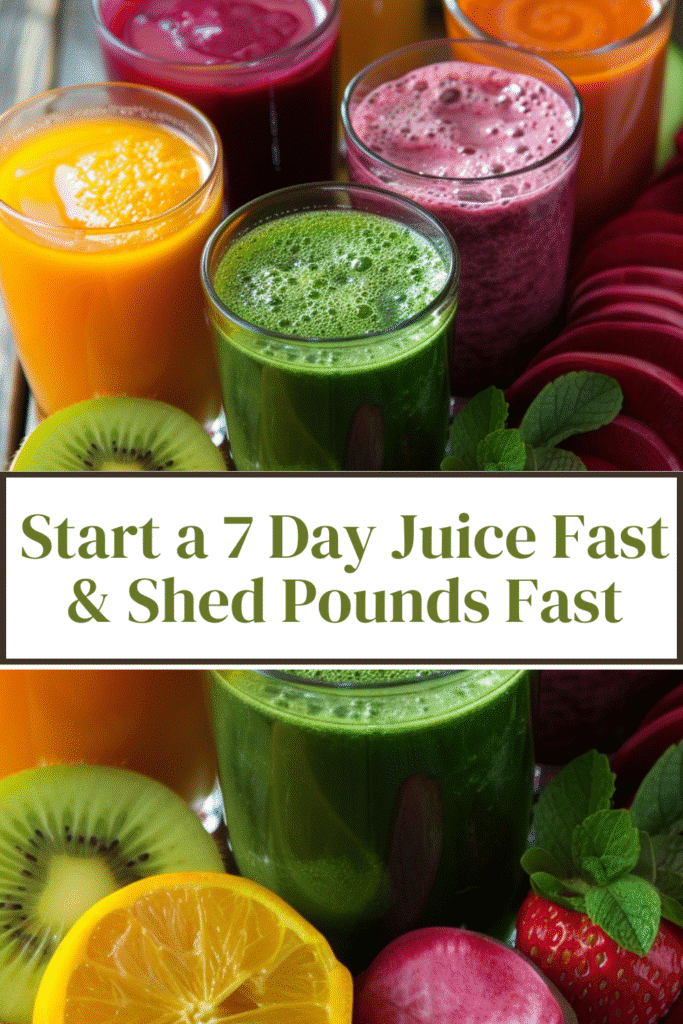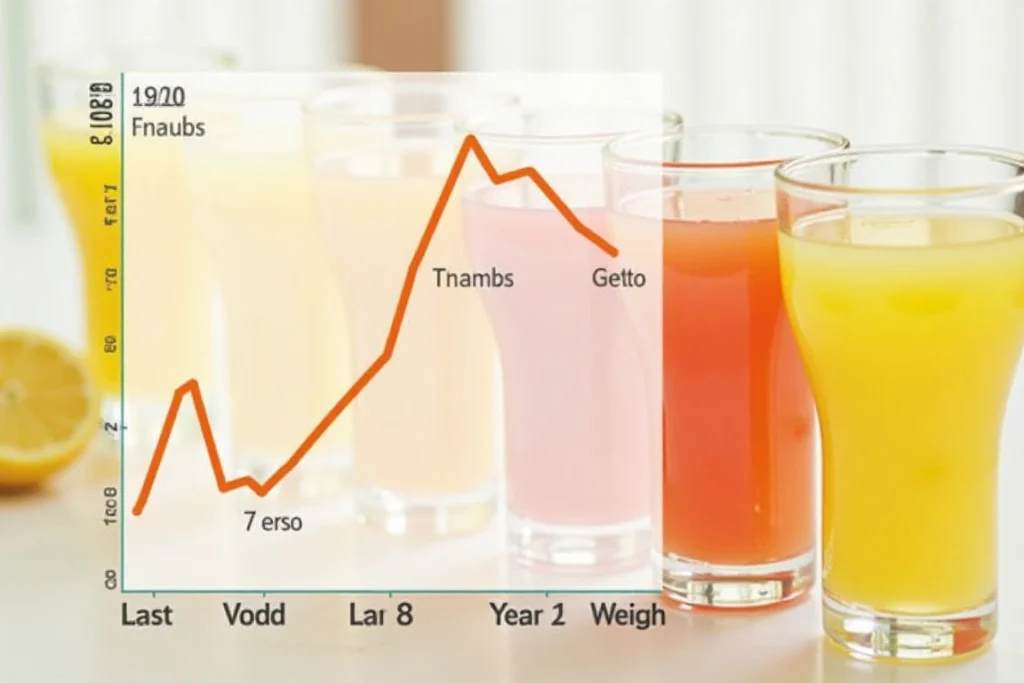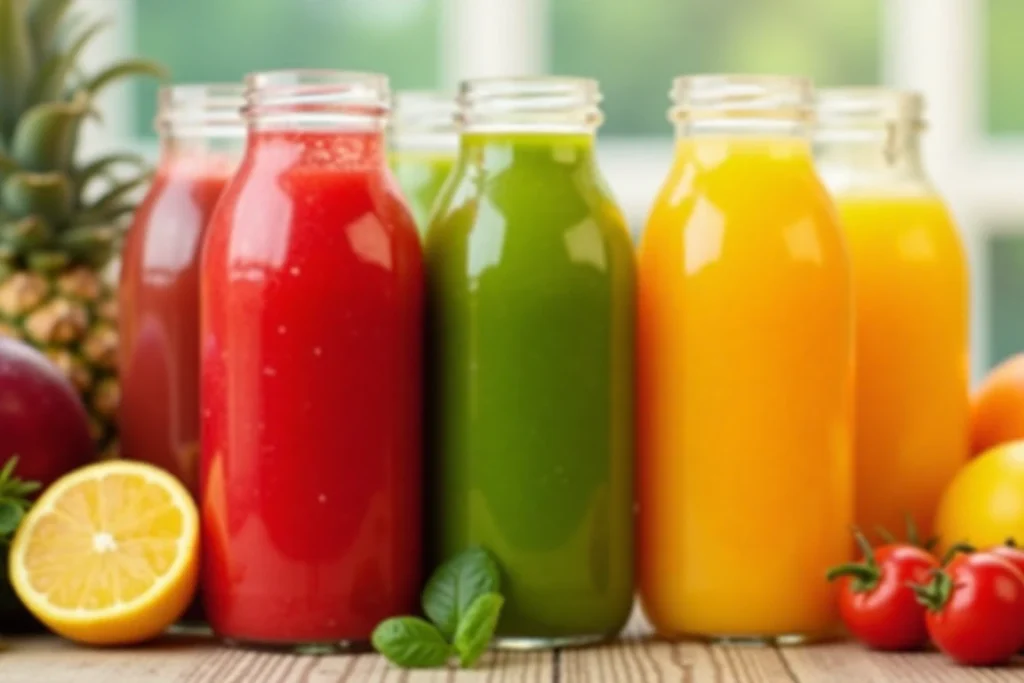
Juice fasting has gained significant popularity in recent years as a quick and seemingly effective method for weight loss and detoxification. This dietary practice involves consuming only freshly extracted fruit and vegetable juices while completely avoiding solid foods. Proponents of juice fasting highlight its ability to provide a concentrated dose of vitamins, minerals, and antioxidants, giving the body a much-needed reset.
Advocates often emphasize that juice fasting does more than just help you shed unwanted pounds it’s also seen as a way to eliminate toxins, boost energy levels, and jumpstart healthier eating habits. By temporarily reducing the burden on the digestive system, juice fasting is thought to allow the body to focus on cleansing and healing itself.
The appeal of juice fasting lies not only in its promises of quick results but also in its simplicity. With an abundance of recipes available and relatively short durations required, this method has attracted people looking for a manageable way to kick off their wellness journey. However, as with any diet, understanding how it works and its potential effects is essential before diving in.
Whether you’re exploring juice fasting for its detoxifying properties, weight loss benefits, or as a stepping stone to a healthier lifestyle, it’s crucial to approach it with realistic expectations and proper preparation to achieve the best results.
Table of Contents
What Is a Juice Fast?
Definition and Overview
A juice fast is a dietary practice where individuals consume only liquid juices made from fresh fruits and vegetables, avoiding all solid foods for a designated period. This period usually lasts from one to seven days, although some people extend it further.
Purpose and Benefits
- Nutrient Boost: The primary goal is to provide an intense supply of vitamins, minerals, and antioxidants.
- Digestive Rest: Eliminating solid foods gives the digestive system a break, allowing the body to redirect energy toward detoxification, healing, and rejuvenation.
How It Works
- Juices are prepared using a juicer or blender, ensuring nutrients are easily absorbed by the body.
- This approach allows for quick nutrient intake without the digestive effort required for solid foods.
Reasons for Juice Fasting
- Detoxification: Advocates believe it helps remove toxins accumulated from processed foods, environmental pollutants, and poor lifestyle choices.
- Weight Loss: The calorie deficit created by consuming only juices often results in rapid weight loss, making it appealing for those looking to start healthier habits.
Common Ingredients
- Fruits: Apples, oranges, berries.
- Vegetables: Kale, spinach, cucumber, celery.
- Additions: Herbs and spices like ginger and turmeric for extra flavor and health benefits.
Suitability and Precautions
- Many people report feeling energized, lighter, and more focused during and after a juice fast.
- However, it may not be suitable for everyone, particularly individuals with medical conditions, pregnant women, or those new to restrictive diets.
- Consultation with a healthcare professional is recommended for safety.
Conclusion
A juice fast is more than just a temporary dietary change—it is often viewed as a chance to reset both the body and mind, laying the foundation for long-term healthy habits.
The Science of Weight Loss During a Juice Fast
Juice fasting promotes weight loss primarily through a calorie deficit, as the daily caloric intake from juices is much lower than a typical diet. Additionally, glycogen depletion in muscles and the liver causes water loss, contributing to rapid weight changes.
Average Weight Loss on a 7-Day Juice Fast

On average, people lose 3 to 10 pounds during a 7-day juice fast. However, most of this is water weight rather than fat loss. Factors like starting weight, caloric content of juices, and activity levels influence the outcome.
Factors That Influence Weight Loss

Several personal factors determine the extent of weight loss during a juice fast:
- Metabolism: Faster metabolisms may burn more calories.
- Activity Levels: Higher activity increases calorie expenditure.
- Starting Weight: Heavier individuals often lose weight more quickly.
Temporary vs. Permanent Weight Loss
One critical aspect of juice fasting is understanding the difference between temporary and permanent weight loss:
- Water Weight: Most early weight loss during a juice fast is due to glycogen depletion, which releases water stored in muscles and the liver.
- Fat Loss: True fat loss occurs slowly and requires a sustained calorie deficit.
- Sustainability: Juice fasting often leads to rapid weight regain unless followed by a balanced diet and lifestyle changes.
Benefits of a Juice Fast Beyond Weight Loss
Juice fasting is associated with benefits beyond just shedding pounds:
- Detoxification: Provides the liver and kidneys a break while flooding the body with antioxidants.
- Better Digestion: A rest from solid foods may help reduce bloating and improve gut health.
- Mental Clarity: Some people report improved focus and energy during a fast.

Risks and Side Effects of a Juice Fast
Despite its benefits, juice fasting comes with potential risks and side effects:
- Nutrient Deficiencies: Lack of protein, fats, and some vitamins can lead to imbalances.
- Fatigue and Dizziness: Low calorie intake may cause energy dips and lightheadedness.
- Muscle Loss: Inadequate protein consumption can lead to muscle breakdown.
Ideal Juices for a 7-Day Fast
Choosing the right juices ensures you get maximum nutrition while supporting weight loss during a juice fast. Recommended juices include:
- Green Juices: Made with kale, spinach, cucumber, celery, and green apples, packed with vitamins and antioxidants.
- Citrus Juices: Orange, lemon, and grapefruit juices for vitamin C and hydration.
- Root Veggie Juices: Carrot, beet, and ginger juices for energy and digestive support.
- Low-Sugar Options: Focus on vegetable-heavy blends to avoid excess sugar intake.
How to Prepare for a Juice Fast
Proper preparation helps your body adapt to a juice fast and reduces potential side effects:
- Ease Into It: Reduce processed foods, caffeine, and sugar a few days before starting.
- Hydrate: Drink plenty of water to stay hydrated.
- Stock Up: Buy fresh produce and ensure your juicer is ready.
- Plan Your Juices: Prepare a variety of juice recipes to avoid boredom and ensure balanced nutrition.
How to Break the Fast Safely
Reintroducing solid foods gradually after a juice fast is crucial to avoid digestive discomfort:
- Start Small: Begin with easily digestible foods like fruits, vegetable soups, and broths.
- Avoid Heavy Foods: Stay away from processed and fatty foods in the first few days.
- Transition Gradually: Slowly increase the variety and complexity of your meals over a week.
- Stay Hydrated: Continue drinking plenty of water to aid digestion.
Success Stories and Testimonials (Continued)
- Sarah’s Postpartum Reset: After having her second child, Sarah completed a 7-day juice fast, losing 6 pounds and kickstarting a healthier routine to regain her energy and confidence.
- John’s Health Comeback: Battling prediabetes, John adopted a 14-day juice fast, resulting in a 15-pound weight loss and improved blood sugar levels, which encouraged him to adopt a plant-based diet.
- Emma’s Skin Glow-Up: Emma focused on juice fasting for skin health, and along with losing 5 pounds in a week, she noticed significant improvements in her complexion.

13. Frequently Asked Questions About Juice Fasting
u003cstrongu003eCan I customize my juices?u003c/strongu003e
Yes! Tailor your juices to your nutritional needs by adding more greens, lowering fruit content, or incorporating superfoods like turmeric or chia seeds.
u003cstrongu003eWill I lose muscle during a juice fast?u003c/strongu003e
A lack of protein can lead to some muscle loss. Short-term juice fasts minimize this, but longer fasts require careful planning or supplementation.
u003cstrongu003eHow much juice should I drink daily?u003c/strongu003e
Typically, drink 4-6 servings of 16-20 ounces each, spacing them out throughout the day to maintain energy levels.
u003cstrongu003eCan I include coffee or tea?u003c/strongu003e
Herbal teas and black coffee (without sugar or cream) are usually acceptable, but caffeine reduction is recommended during a fast.
u003cstrongu003eHow long should a beginner fast?u003c/strongu003e
Start with a 1-3 day juice fast to gauge how your body reacts before attempting longer fasts.
Does a juice cleanse shrink your stomach?
No, a juice cleanse does not physically “shrink” your stomach. However, consuming less food during a cleanse may reduce bloating and help you feel less stretched in your abdominal area. Over time, eating smaller portions can make you feel full more quickly, but this is due to hormonal adjustments rather than a change in stomach size.
Why am I not losing weight when I juice fast?
There are several reasons you might not see weight loss during a juice fast:
- Caloric Intake: Some juice recipes, especially those with high fruit content, are calorie-dense and may not create a calorie deficit.
- Water Retention: Your body may be holding on to water due to stress, sodium, or hormonal factors.
- Metabolism: If your metabolism has slowed due to prolonged low-calorie intake, weight loss may be delayed.
- Muscle Retention vs. Fat Loss: Initial weight loss might not be apparent if you’re losing fat but retaining muscle mass or water weight.
What is the hardest day of a juice cleanse?
The hardest days are typically Day 2 or Day 3 of a juice cleanse. During this time, your body is adjusting to the lack of solid food, and glycogen stores are depleting. This may lead to symptoms like headaches, fatigue, irritability, or cravings, often referred to as the “detox phase.” Most people feel better by Day 4 as their energy levels stabilize.
How much weight can you lose on Slim Fast in a week?
On the SlimFast plan, weight loss typically ranges from 1 to 2 pounds per week, which aligns with general safe weight loss recommendations. However, some individuals may lose more weight in the first week due to water weight loss when starting a calorie-controlled diet. The exact amount depends on factors like starting weight, activity level, and adherence to the plan.
When discussing the importance of juice composition, link to an article detailing Healthy Juice Recipes to offer readers practical options.In the section about maintaining weight loss post-fast, link to Sustainable Eating Habits to guide readers on long-term health strategies.
14. Expert Opinions on Juice Fasting
Nutritionists and doctors have varying opinions on juice fasting. Here’s a summary:
Pros Highlighted by Experts
- Nutrient Boost: Juice fasting can deliver a concentrated dose of vitamins, minerals, and antioxidants.
- Digestive Rest: Doctors note that short-term juice fasts may help reduce bloating and give the digestive system a break.
- Resetting Habits: Some dietitians believe juice fasting can be a psychological reset for better long-term eating habits.
🍋 Love fresh, healthy ideas? Follow me on Pinterest for more delicious detox and weight loss pins you’ll want to save!
Concerns Raised by Experts
- Nutritional Deficiency: Many healthcare professionals caution against the lack of protein, healthy fats, and fiber in a juice-only diet.
- Temporary Weight Loss: Most of the weight lost is water weight, which is often regained after the fast ends.
- Unsuitability for Everyone: Juice fasting is not recommended for pregnant women, people with diabetes, or those with certain medical conditions.
15. Conclusion and Final Thoughts
A 7-day juice fast can be a quick way to jumpstart weight loss and introduce healthier habits, but it is not a sustainable solution for long-term health.
Pros
- Promotes a calorie deficit leading to temporary weight loss.
- Provides a nutrient-rich boost to the body.
- Encourages mindfulness about eating habits.
Cons
- Most weight loss is temporary (water weight).
- Potential nutrient deficiencies due to lack of protein and fiber.
- May cause fatigue, cravings, and other side effects.
Realistic Outcomes
If approached carefully and followed by a balanced diet, a juice fast can be an effective way to transition into a healthier lifestyle. However, long-term success depends on adopting sustainable eating and exercise habits.
7 Day Juice Fast
Ingredients
Fruits for Juicing
- 7 pieces Apples For sweetness and flavor.
- 7 pieces Oranges For vitamin C.
- 2 cups Berries Blueberries or strawberries for antioxidants.
Vegetables for Juicing
- 2 cups Kale Packed with vitamins.
- 2 cups Spinach Rich in iron and calcium.
- 1 piece Cucumber For hydration.
- 2 pieces Celery Helps reduce bloating.
Flavor Enhancers
- 1 tablespoon Ginger For added spice and digestive support.
- 1 tablespoon Turmeric For anti-inflammatory properties.
Instructions
Preparation
- Gather all fruits and vegetables.
- Wash and prepare the produce by chopping them into sizes that fit your juicer.
- Prepare a variety of juices throughout the week to maintain flavor excitement.
Juicing Process
- Use a juicer or blender to extract juices from the prepared fruits and vegetables.
- Combine different fruits and vegetables to create unique juice blends.
- Aim for 4-6 servings of 16-20 ounces of juice daily.
Post-Fast Gradual Reintroduction
- After seven days, start reintroducing solid foods gradually.
- Begin with easily digestible foods like fruits and vegetable soups.
- Avoid heavy and processed foods for the first few days after the fast.

